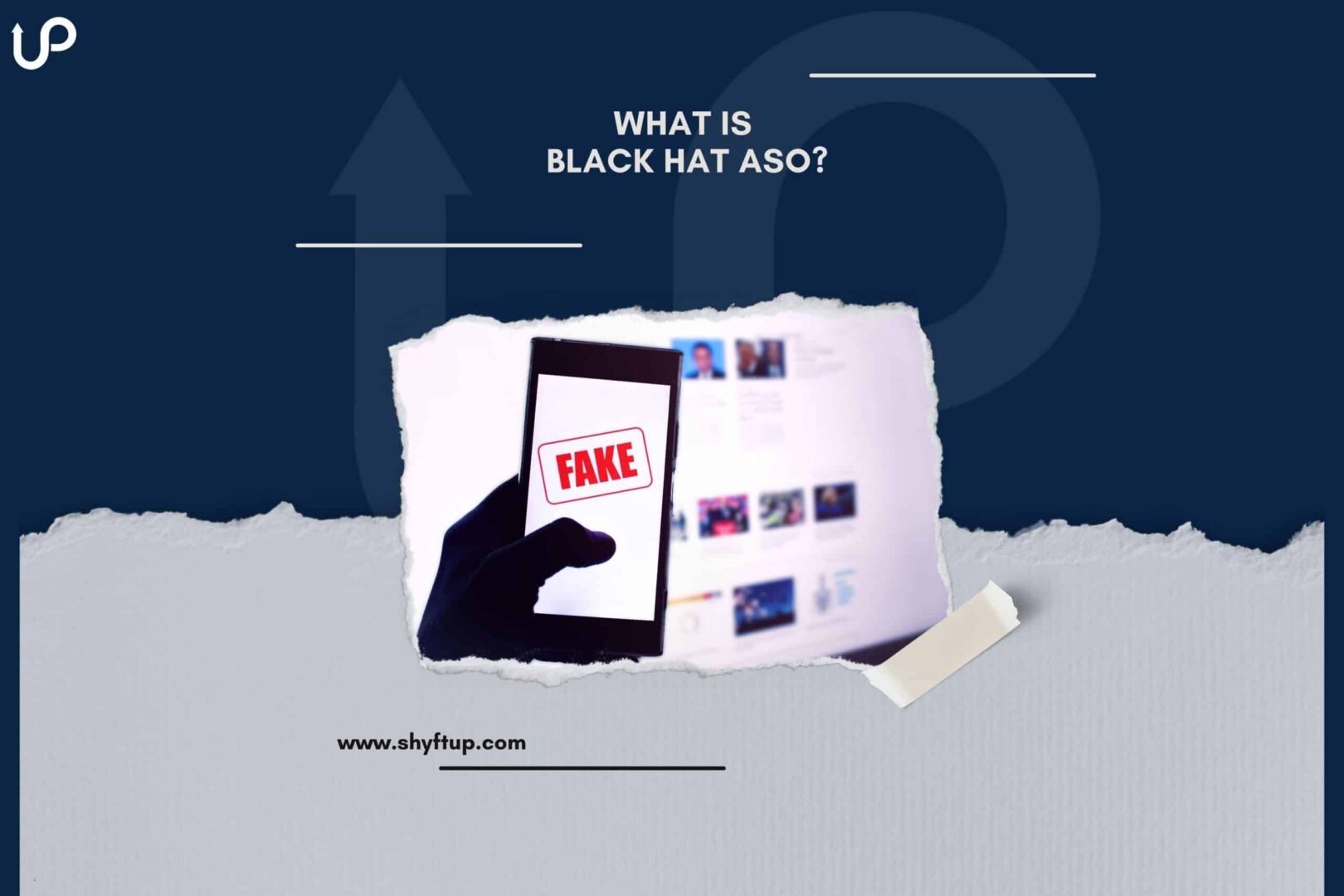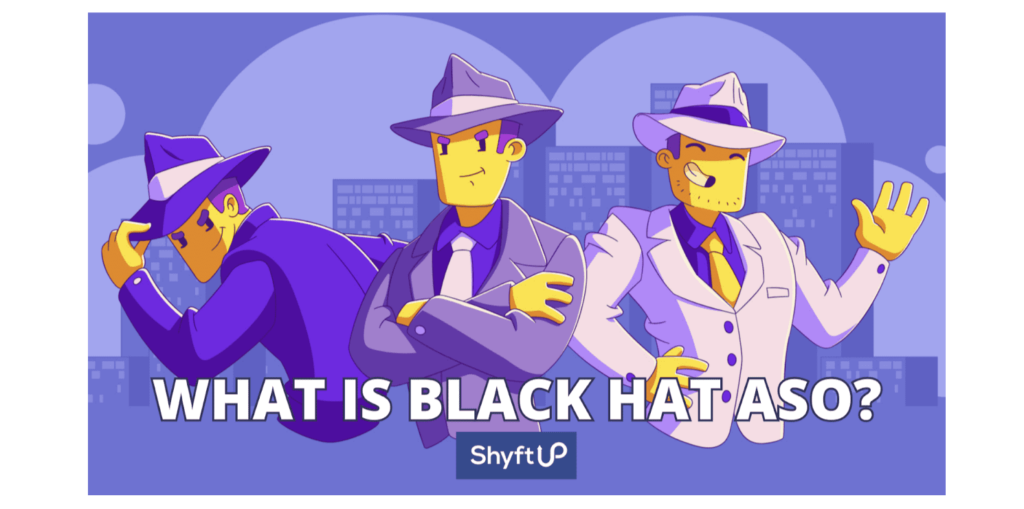
What is Black Hat ASO?
Have you ever wondered what black hat ASO is? It’s a type of ASO technique that helps you improve your app ranking in a quicker, faster, and more cost-effective way. However, before you consider using black hat ASO techniques, you need to realize its dark secret. There’s a reason why it is called black hat ASO.
Yes, black hat ASO can give you impressive results in the shortest amount of time, but they are illegal, deceitful, and controversial. Thus, black hat ASO can give you a quick fix to your ASO problems, but they can get you in trouble.
Now, this might have pricked your curiosity and you want to learn more about black hat ASO. Thankfully, this article will help you. We will go deeper into black hat ASO and discuss what it is, how it works, its negative effects, and what you should do instead.
What is black hat ASO?
Black hat ASO, also called unethical ASO, is the process of using deceptive and manipulative techniques and strategies to trick app stores and gain increased visibility of your app and in the process, improve its app ranking.
You probably heard of black hat SEO (Search Engine Optimization). Black hat ASO and black hat ASO are essentially the same in definition, but the main difference is that the former focuses on app stores while the latter focuses on search engines.
What are examples of black hat ASO?
There are different ways that app developers and marketers might try to deceive not just people but also the app stores like App Store and Play Store. To give you an idea, check out these unethical ASO practices:
Fake reviews
One of the best ways for you to quickly grow your app’s user base is to receive positive reviews and high ratings. However, getting reviews from legitimate users can be difficult. Not only that but there’s no guarantee that users will give you high ratings.
So, as a black hat ASO marketer, what do you do? You turn to fake reviews.
Fake reviews can be generated in different ways. For example, you can hire a company or pay individuals to give you positive reviews even though they haven’t really used your app. Another way this is done is by using bots or automated tools.
Keyword stuffing
People use keywords or key phrases when looking for something on the Internet. When internet marketers discovered that Google uses keywords to determine the rank of a website, they abused this system and thus, the black hat SEO was born. This unethical practice was carried to app stores and now, keyword stuffing also happens as part of black hat ASO.
Keyword stuffing can happen in different ways however, the most common way it is done is by adding keywords in the URL and app description.
Keyword stuffing is a bigger problem in Google’s Play Store since Google puts more emphasis on keywords.
Fake downloads
If there are fake reviews, there are also fake downloads. This is done by paying a company or a group of people to download your app. There’s no intent of using the app, but the only aim is to artificially increase the number of downloads.
With fake downloads, you get a sudden spike in the number of your downloads per day and then a sharp decline follows.
Exaggerated or unfounded claims
App developers may opt to add exaggerated claims to their app listing page. For example, they can claim to be the best, most-celebrated, and number 1 app in their category. They may even change their app name to look like they are a highly rated app.
Adding false claims to your app page is one way to misrepresent your app. It doesn’t just fool the app store, but also potential and existing users.
What are the risks of using Black Hat ASO techniques for my app?
While black hat ASO could actually give you quick positive results, you would soon see that it is not worth your time and energy the moment you start reaping its dire consequences. Just to give you an idea, here are some of the possible results of using black hat ASO:
- Low user retention – yes, you can fool people, but you can’t fool them forever. The moment they discover that your app isn’t what it claims to be, then they will simply uninstall your app. This would affect your user retention rate, which app stores would take note of. If your retention rate continues to fall, app stores could stop featuring your app in search results.
- Short-term success – to truly be successful in the app store, you need to think long-term. Yes, black hat ASO can give you a sudden spike in your app installs, but it will not last long. People will walk away from your app because it failed to meet their expectations.
- Loss of credibility – it is difficult to build a good brand or app reputation. It would take years to truly establish your credibility. However, you can destroy your reputation overnight by using black hat ASO. People won’t trust you anymore and this will cause your app to lose popularity.
- Wasted time and resources – black hat ASO isn’t free. You have to pay for it with your time, energy, and money. Since black hat ASO doesn’t really help much in the long run, you will be just wasting time and money — resources that you could have used to improve your app.
- App store ban – app stores are serious about penalizing app developers and marketers who use black hat ASO. Black hat ASO techniques breach the contract you made with the app stores and thus, you can be banned from their platform. If not banned, you might lose your app ranking and users.
If not black hat ASO, what should you do?
With what we have already discussed, it is obvious that you shouldn’t use black hat ASO techniques. What you should focus on instead would be doing white hat ASO. The two are completely opposite and the other gives you more positive results in the long run.
White hat or ethical ASO techniques include the following:
- Proper keyword research and placement
- The use of the correct app icon, screenshots, and app previews
- Encouraging legitimate users to leave honest reviews
- Continued app updates and improvements
As you can see, white hat ASO techniques focus on creating a high-quality app that delivers an exemplary user experience. When done right, white hat ASO techniques lead to higher app ranking and visibility, which brings more downloads and long-term success.
Still need help?
Now that you know what black hat ASO is, you might already realize that there’s no shortcut to success. Thankfully, you don’t really need a shortcut but rather the right help to reach your app goals. But where can you get that help? You can do that by partnering with ShyftUp.
ShyftUp is among the leading user acquisition agencies today that have immense knowledge in performing effective, reliable, and most importantly, ethical app store optimization campaigns. They have the right expertise and knowledge to help you get highly engaged and loyal users for your app.
Why is black hat ASO considered unethical?
Black hat ASO is considered unethical because it is deceptive and produces unfair advantages over other apps. Aside from that, black hat ASO is a deliberate way of misrepresenting your app with the main goal of getting more installs.
Can you do black hat ASO and get away with it?
Google, Apple, and other app stores use sophisticated and powerful algorithms to detect black hat ASO. Sooner or later, you will be found out. Even if you’re not caught, the negative effects of black hat ASO would punish you automatically. So, it’s really not worth it even if you’re not directly penalized by Google or Apple.
How can I avoid using black hat ASO techniques?
You can avoid using black hat ASO techniques by simply doing what is right and fair. You can start reading the terms and conditions of your chosen app store. From there, you can see what is allowed and what is not allowed when it comes to promoting your app. Aside from that, you can focus more on improving your app and user experience, which are tested and proven ways to increase your app ranking and attract more users.

